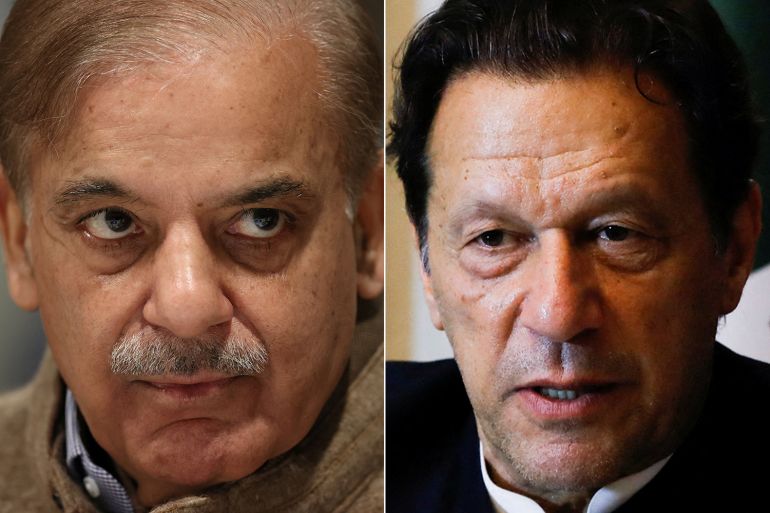Pakistan government, Imran Khan’s PTI agree on simultaneous polls
Late-night talks between the ruling alliance and Khan’s party, however, end without any agreement on an election date.

Islamabad, Pakistan – Pakistan’s ruling alliance and the main opposition party have ended a crucial round of talks with a consensus on holding simultaneous national and provincial elections in the country.
The late Tuesday night talks between the ruling Pakistan Democratic Movement (PDM) and former Prime Minister Imran Khan’s Pakistan Tehreek-e-Insaf (PTI), however, ended without any agreement on a poll date.
Keep reading
list of 4 itemsWhere does Pakistan find itself year after Imran Khan lost power?
Pakistan election panel seeks change in law guiding its powers
IMF forecasts Pakistan’s economy to slump, inflation to rise
The two sides held the negotiations after Pakistan’s Supreme Court last month ordered the political parties to consult among themselves to agree on an election date.
Pakistan historically holds the national and provincial elections together. General elections are due in October this year.
But a crisis emerged in January after PTI, in a bid to force the government to call for early elections, decided to dissolve the legislative assemblies in Punjab and Khyber Pakhtunkhwa provinces it controlled.
After the government dithered on announcing an election date in the two provinces as mandated by a 90-day deadline in the constitution, the PTI petitioned the top court, which on April 4 ordered Punjab provincial election on May 14.
But the government says the ongoing economic and security crises make it difficult to hold any electoral exercise at the moment and has even questioned the legality of the Supreme Court making such orders.
‘Great achievement’
Federal Finance Minister Ishaq Dar, who led Tuesday’s talks on behalf of the government, later told reporters that reaching a consensus on holding elections together was a “great achievement”.
“The main point, however, is deciding upon the date of elections. Both sides have their own suggested dates, and we have tried to narrow them down and showed elasticity in our approach,” he said.
“We hope that both the parties will continue in the same manner with sincerity.”
Shah Mahmood Qureshi, senior PTI leader who led his party in the talks, said agreeing on one poll date was a “complicated process”, adding that both sides were trying to find common ground.
“We must determine a mechanism to agree on an election date to ensure we can move forward,” he said.
Qureshi said the PTI was ready for an amendment in law that mandates elections within 90 days of the dissolution of a legislative assembly.
“PTI is willing to go to parliament and give constitutional cover for delaying the election in a one-off amendment,” he said.
To make any constitutional amendment, a two-thirds majority is required in the national assembly. However, after Khan’s ouster from the government last year, the PTI has refused to be a part of parliamentary procedures as an act of protest.
Qureshi added that any agreement they reach with the government should be in writing and endorsed by the Supreme Court to ensure its implementation.
PTI leader Fawad Chaudhry, who also participated in the talks with the government, told Al Jazeera on Wednesday that his party insisted on holding the national and provincial polls on May 14.
“But their stance is that this date is too soon. They seem willing to dissolve the assemblies, but unsure when to do it. We are looking forward to a resolution,” he told Al Jazeera.
Malik Ahmad Khan, special assistant to Prime Minister Shehbaz Sharif, questioned the PTI’s stand.
“If assemblies are dissolved due to political expediency, it would be mala fide. It is important that we have caretaker governments everywhere before holding general elections,” he told Al Jazeera.
Political analyst Syed Talat Hussain said he was not sure about the success of the ongoing negotiations between the government and the main opposition party.
“These negotiations are doomed to fail. They were initiated not by any political desire by the participants to resolve the issue, but this was dictated by the Supreme Court, which itself is controversial in the eyes of the government,” he told Al Jazeera.
Lahore-based analyst Benazir Shah was also sceptical of the outcome of the talks.
“There is a clear trust deficit between the two sides, who have not sat down together for a parley for many years. PTI, even when it was in power, had taken a hardline position about holding talks with other political parties, often saying they would rather negotiate with terrorists but not their political rivals,” she told Al Jazeera.
Shah said another electoral factor could hamper the announcement of a poll date in the country.
“Once the census is completed, the process of delimitation of constituencies will begin, which could take anywhere between four to five months, meaning election cannot be held anytime before October or November. It would only make sense for the new polls to be held using an updated population census. If PTI can be convinced of this, then there can be a way forward,” she said.